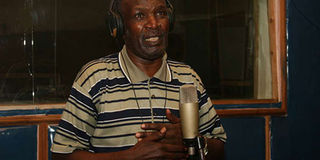Kamaru: The chronicler of history, public intellectual

Joseph Kamaru in a studio recording a song. Kamaru’s music could be easy to the ear and to shake a leg too. PHOTO | FILE | NATION MEDIA GROUP
What you need to know:
- A song like "Ndanuko cia Mutahato" engages deeply with the notion of modernity and city life in a community that was getting quickly urbanised and forgetful of their cultural roots.
- Kamaru would not hesitate to praise the government when he felt that it deserved accolades and criticise it when things didn’t go down well.
The proverb "When an old person dies, a library burns", could be appropriate as we mourn the death of the most celebrated Kikuyu musician, Joseph Kamaru.
His audience should be consoled by the fact that Kamaru has shared his wisdom in the thousands of songs that he has produced since entering the music scene in the 1960s.
His music forms part of the memory of Kenya’s history and Kikuyu culture.
Whereas Kamaru’s body of work, with its advocacy for the respect of traditions and cultures of the community, has been the vanguard of what today is referred to as the popular music of the Kikuyu, there is a brand of young, contemporary urban musicians whose affinity to tradition defines new ways in which Kikuyu culture is being reimagined.
But the reference point has always been Joseph Kamaru.
While, as a nation, we are fascinated by the ''sponsor'' phenomenon dominating acres of space in our media instead of focusing on the resultant systemic femicide and wanton violence visited on women, Kamaru had initiated this debate on the state of morality in a newly-independent Kenya, way back in the 60s, in his music, with songs like "Ndari ya Mwarimu" and "Andu a Madaraka", among many other songs.
MODERNITY
As Kenyans trooped to Nairobi after independence, Kamaru and his contemporaries, CDM Kiratu, DK wa Maria and Francis Rugwiti creatively, in their songs, started a discussion on the rural-urban migration, probably as a response to the government’s clarion call of turudi mashambani (let's return to the villages).
This debate offered a template on which to talk about the space that Nairobi was, a pertinent theme hitherto.
A song like "Ndanuko cia Mutahato" engages deeply with the notion of modernity and city life in a community that was getting quickly urbanised and forgetful of their cultural roots.
Kamaru in the song invites us to rethink what maendeleo (development) really means, a question we have to keep asking ourselves today as a country.
In the recent years, we have witnessed a semblance of a cultural renaissance among the Kikuyu in the big cities and those in the diaspora.
But a keen follower of the music of Kamaru may not necessary need to be schooled on matters cultural, because his songs have been reservoirs of the cultural and indigenous knowledge systems of the Kikuyu. This is the public intellectual that he has been.
CREATIVITY
Kamaru has been the chronicler of Kenyan history too.
In days where we have musicians sourcing their lyrics from TV news and rushing to record their songs the following day, Kamaru’s songs were meticulous and well-thought-out.
No one ever described the gravity of assassination of JM Kariuki better than Kamaru in 1975. Indeed, his song, among other musicians, was banned.
Keen scholars of his music have resisted the urge to discuss the prophetic line that spelt doom on JM's murderers.
Those who killed JM, he said in the song, would one day, be rolled downhill in a beehive in the full glare of the Kenyan public: “No kinya akagaragario na mwati, muingi wothe wa Kenya wuroreire”. This has been subject to various interpretations over the years.
Kamaru would not hesitate to praise the government when he felt that it deserved accolades and criticise it when things didn’t go down well, especially during the regimes of Jomo Kenyatta and Daniel Moi.
WATCHDOG
In days when the opposition was silenced, it was his music that would offer inspiration and hope to the suffering Kenyans, as well as reminding the ruling elite of their sacrosanct duty to serve the public.
In the clamour for the multiparty democracy in the 1990s, Kamaru once told Moi to his face in a public rally that Kenyans were tired of his rule.
It is this boldness that has defined his music over the years.
Kamaru’s music could be easy to the ear and to shake a leg too.
But his grasp of the Kikuyu language cannot be matched by budding musicians, or even by the purveyors of the cultural renaissance.
His use of the language made it comfortable to comment on almost everything, with his usual rider that "those that have ears know what I am talking about".
It is true that the oral history and tradition of his people guided his compositions.
BRILLIANCE
In my research on his music, I would often seek counsel of the elders in my community, including my late parents (avowed fans of Kamaru), to try and decode the message in the lyrics.
Whereas he has groomed musicians like De Matthew, Kariuki wa Kiarutara, Musaimo and many others in the mastery of the language to give kirira to his audience, Kamaru was cut from a different cloth.
His collections of the Mau Mau songs and traditional Kikuyu dances remain useful archives for the memory of Kenya’s history and a reservoir of the community’s cultural heritage.
Probably, the people who are fronting this cultural awakening must make sure that part of the education they offer to their recruits must include a full knowledge of Kamaru’s thousands of songs, and the wisdom that oozes in his music.
KING
His importance and contribution to the growth of Kikuyu music is underlined by the fact that any Mugithi night without a rendition of Kamaru’s songs is incomplete.
The one-man guitar artistes have harped on his popularity to launch their careers. His audience also keeps citing his songs to give authority to their arguments.
Scholars have referred to him as the King of Kikuyu pop, the teacher of the masses, the Kikuyu cultural ambassador and many others. I just choose to see him as a public intellectual. Uromama kwega kuuraga awa.
Dr Mutonya is a leading scholar and researcher of Kikuyu popular music. He has published widely on Joseph Kamaru’s music. E-mail address: [email protected] Twitter: @MainaMutonya




